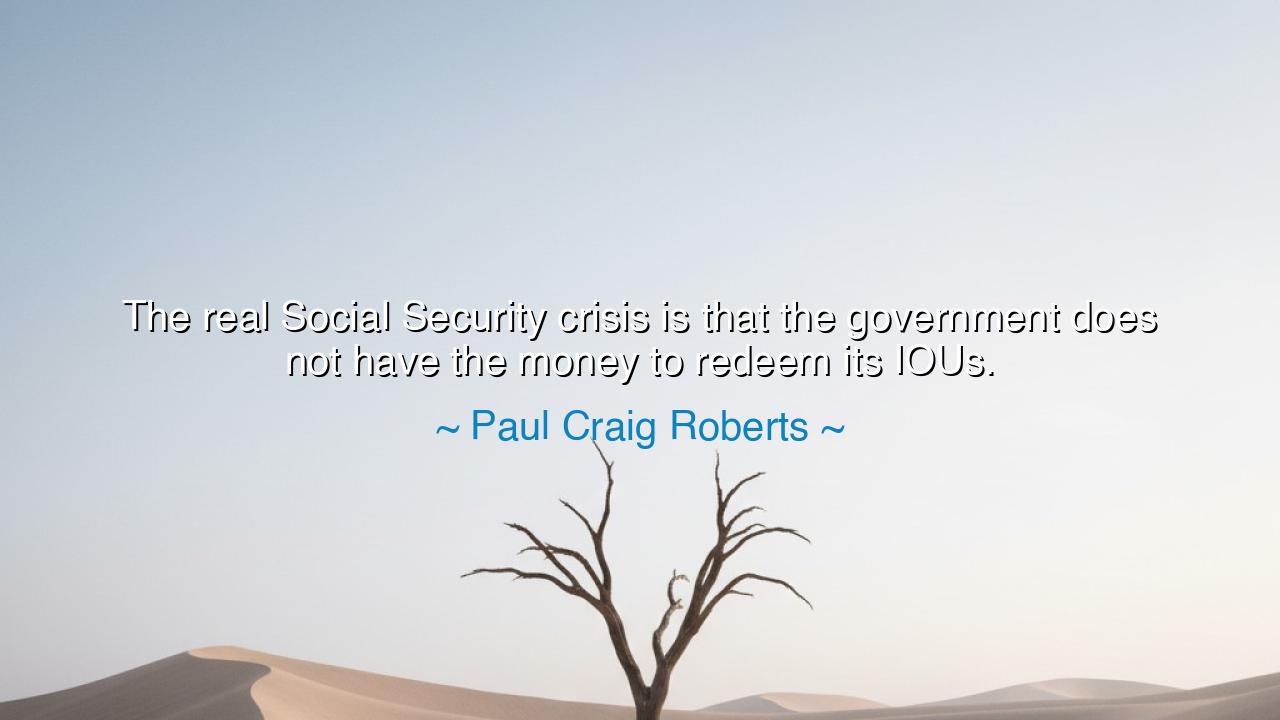
The real Social Security crisis is that the government does not
The real Social Security crisis is that the government does not have the money to redeem its IOUs.






"The real Social Security crisis is that the government does not have the money to redeem its IOUs." – Paul Craig Roberts
In this sharp and sobering declaration, Paul Craig Roberts, an American economist and former Assistant Secretary of the Treasury, exposes a truth often buried beneath the comforting language of policy and bureaucracy. His words pierce through illusion to reveal a troubling reality: that the Social Security system, long seen as a pillar of security for the aging, rests not upon solid gold, but upon promises written on paper—promises that, when called due, may find the vaults empty. His warning is not only about economics, but about the moral duty of government—the sacred trust between rulers and the people they serve.
The origin of this quote lies in Roberts’ deep critique of fiscal irresponsibility within the U.S. government. Having served in the Treasury under President Ronald Reagan, he witnessed firsthand how political expediency often triumphed over prudence. Social Security, established during Franklin D. Roosevelt’s New Deal, was meant to ensure that no worker, after a lifetime of labor, would face destitution in old age. Yet as decades passed, the funds paid into this system were not kept in secure reserves; they were borrowed by the federal government and replaced with IOUs—government bonds backed only by future taxation. Thus, Roberts declares the “real crisis” is not demographic, as often claimed, but financial and moral: the money has been spent, and what remains are mere promises waiting to be redeemed by future generations.
The meaning of his words reaches beyond economics—it speaks to the nature of trust and accountability in human institutions. Governments, like individuals, must keep their word or lose their integrity. When citizens pay into a system for decades, they do so with faith that their government will honor its commitments. To discover that their savings have been transformed into debt obligations—that the treasury is filled not with gold but with paper—is to feel the sting of betrayal. Roberts’ voice, though calm, echoes the cry of every laborer who asks, “Where is the fruit of my toil?”
History offers many lessons in the danger of false promises. Consider the collapse of the Roman Empire, when emperors debased the currency to fund endless wars and public spectacles. What began as silver coins ended as worthless copper, and the empire’s citizens, once rich in trade and confidence, were left impoverished. The Roman denarius, like modern trust funds, became an empty symbol. Roberts’ warning is the modern form of that same ancient truth: when a state consumes today what belongs to tomorrow, it mortgages not just its wealth, but its honor.
Yet Roberts’ message is not one of despair—it is a call to responsibility. The “IOUs” he speaks of are not merely financial instruments; they are the measure of a nation’s character. A government that borrows from the future to placate the present acts as a thief of generations. But a government that faces truth with courage—cutting waste, reforming spending, and rebuilding trust—can restore the bond between citizen and state. Roberts reminds us that reform must begin not with panic, but with principle. For a society that spends recklessly cannot claim to be free; it is bound by its own deceit.
In his quote, there is also a profound moral metaphor. The “IOUs” of government mirror the spiritual debts of humanity—our tendency to postpone reckoning, to believe that the future will somehow pay for the indulgence of the present. Just as a nation cannot forever spend more than it earns, so too can a person not live beyond their moral means. Sooner or later, the ledger must be balanced. The wisdom of Roberts’ words, therefore, applies to both the soul and the state: live within your means, keep your promises, and let your actions be as honest as your words.
The lesson, then, is clear and enduring. Trust, once broken, is the hardest currency to restore. Each generation must guard the integrity of its institutions, demand transparency from its leaders, and remember that prosperity without responsibility is illusion. Citizens must not wait for governments alone to act—they too must be vigilant, informed, and courageous in defending fiscal truth.
Let Roberts’ warning ring not as prophecy of doom, but as a call to renewal. For a people who confront hard truths with courage can rebuild even from debt and decay. But a people who hide behind illusions will awaken to find their promises hollow. The true security of a nation lies not in its funds, but in its faithfulness. And when a government once more becomes worthy of its citizens’ trust, its IOUs will no longer be paper—they will be bonds of honor, sealed by integrity, and sustained by the conscience of a free and responsible people.






AAdministratorAdministrator
Welcome, honored guests. Please leave a comment, we will respond soon